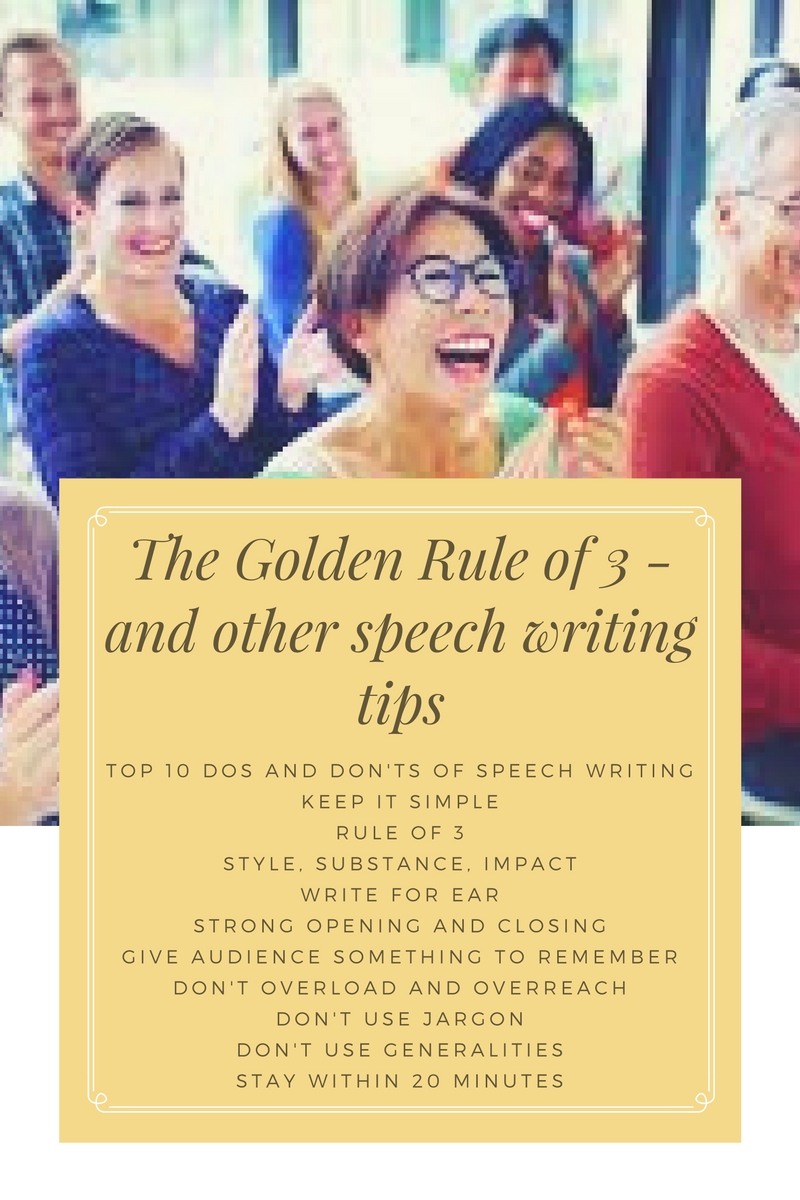
I’m going to let you in on the three secrets of speech writing. They are:
- Substance, or what you say
- Style. How you deliver and the words you choose to use.
- Impact . Did the speaker make a difference in the audience? Does it have a call to action?
But before you write the first word, you need to determine the framework surrounding your speech. Is it going to be persuasive or informative? Is it a daytime or evening event? Who will your audience be? Why should they care about your message? How will they benefit from the information you give them?
Will you be giving the speech or are you writing it for someone else? In business, many times you’ll be called upon to write for your CEO.
To successfully write for another speaker, you need access and collaboration with the speaker (CEO). If you don’t have it, you need to ask for it. You need to spend some prep time with this person. How do they gesture? Do they have phrases they naturally use in conversation?
You’ll need: a Pre-draft meeting, a first draft meeting, a revision meeting, rehearsal, and a post speech interview. I suggest having as few people as possible there and make sure you bring your own ideas to the meeting.
Speeches need a formal structure just like an essay. They have an opening, a body, and a closing.
Introductions should be 20 sec to 2 min. It eases your listener into speech. Make sure your information follows a logical order.
Your audience must believe your speaker as well. Do they share an interest? Try sharing something special about you. It will open their curiosity.
A word of warning. Humor is best used carefully. The safest form of humor is for the speaker to make fun of themselves. It’s also the fastest way to lose the audience if an attempt at humor goes bad.
Once you move to the body of the speech, you need to choose one theme or purpose. Tell your audience what you are telling them, tell them again, then tell them that you told them. If your audience can tell you don’t care about them or the topic, they won’t care either.
One of the best forms to use for your speech is the “Golden rule of 3.”
Tell your audience you have three thoughts to share with them. Make sure your most important is the last item told. The next most important idea should be your first one. And finally, the least important should be in the middle because it is often forgotten.
Good speeches use examples. Make sure you round numbers off but don’t use too many stats. People zone out on numbers. Use illustrations. Try to paint a picture for your listener.
The best speechwriters, write for the ear. Speeches are not written to be read. Keep it simple. Use active voice. Use contractions. Vivid verbs are best. Vary your sentence lengths. Avoid jargon. Repetition is key. Ask rhetorical questions. Use personal pronouns. Use alliteration.
You want to be the speaker they remember. If you appear genuine, you’ll be a step closer.
End on strong note. Your closing shouldn’t end with a whimper. You need a strong call to action. It should be brief. Make it a challenge and restate purpose.
Once you’ve got a completed draft, read it aloud. Listen for tongue twisters. Are your ideas clear? Do the transitions flow? Does every word you chose have meaning? If not, delete it.
Now you’re ready to give the speech! Smile when you give it. Record it.


